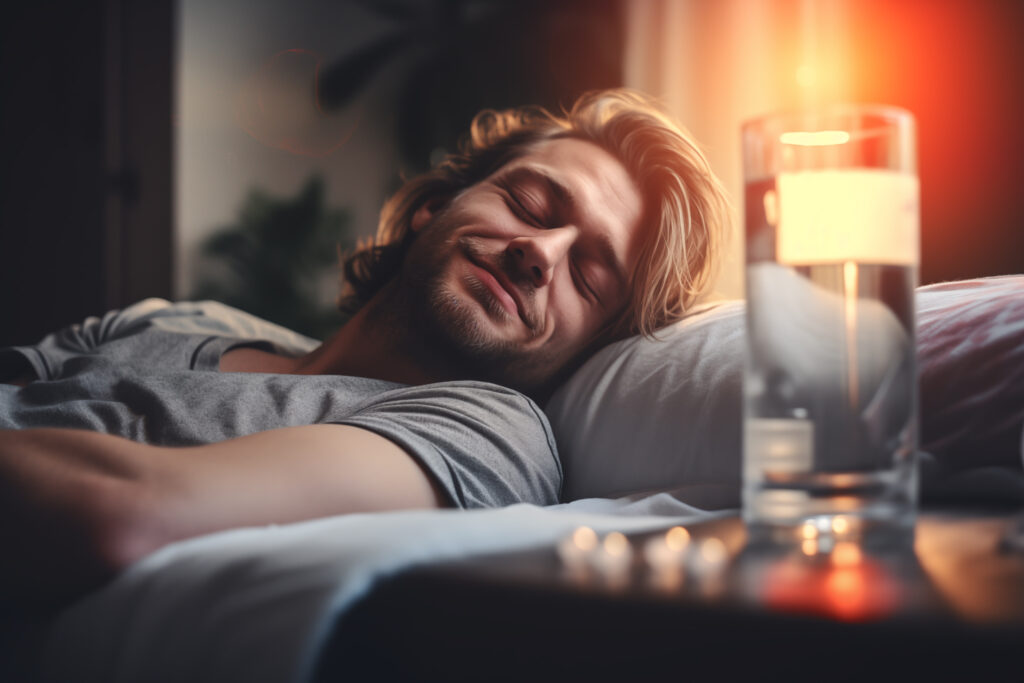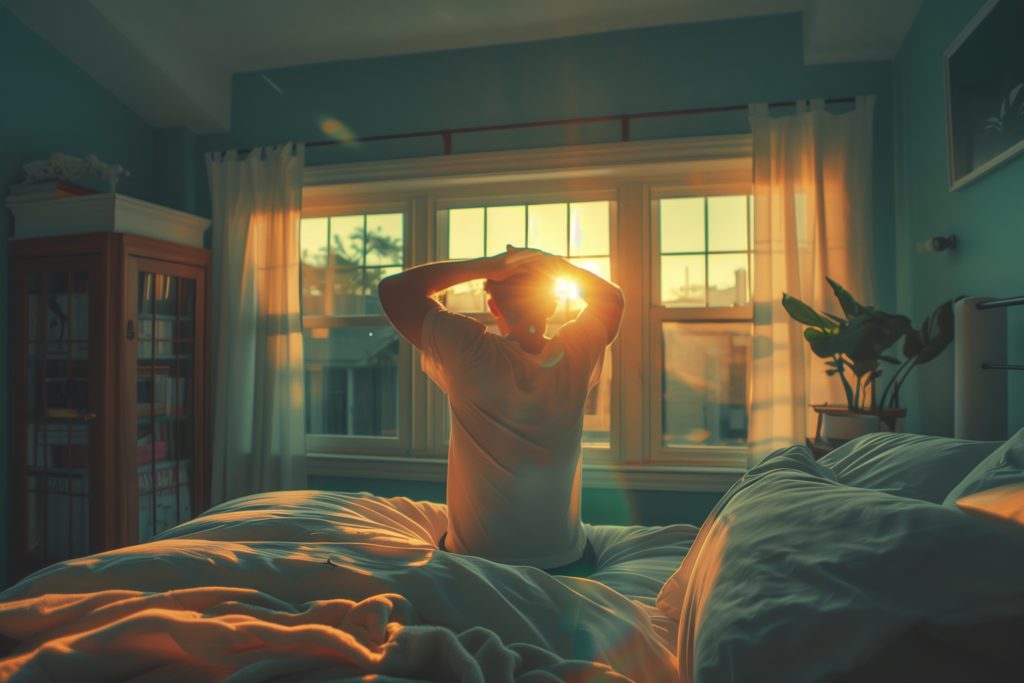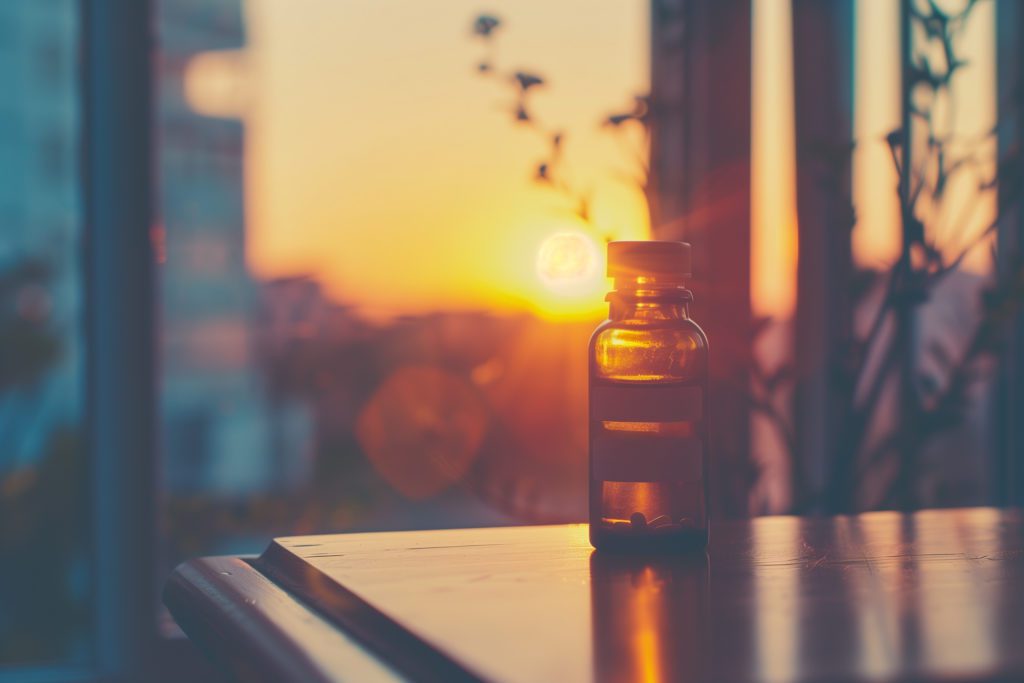
Natural Ways to Boost Melatonin Production for Better Sleep
Learn about melatonin’s role in sleep and how you can naturally boost melatonin to fall asleep easier and stay asleep all night.

Few things are as frustrating as lying down to go to bed only to feel wide awake. As you lie there—trying to will your body to sleep—the hours left before your alarm goes off are tallying in your head, getting smaller with each second you’re stuck awake.
When you find yourself in this situation, low melatonin production may be to blame because of melatonin’s role in helping your body feel sleepy. The body naturally produces melatonin when the sun goes down, but things such as caffeine, light, and electronics can interfere with its production, leaving you awake even when you want to be asleep.
While melatonin supplements exist, some side effects can include lingering drowsiness during the day, headaches, and nightmares. For those who experience these side effects of melatonin supplements or want to fall asleep easier without a supplement, there are ways to naturally boost your melatonin production.
Why Is Melatonin Important for Sleep?
When it comes to the body’s preparations for sleep, melatonin production is at the top of the list.
Also known as the sleepiness hormone, melatonin is produced by the brain in response to darkness. As the sun goes down, melatonin production increases, and so does sleepiness.
Not only does melatonin help you feel tired enough to sleep, but it also keeps you asleep during the night so that you can experience the deep, restorative sleep that is only attainable when you aren’t waking up multiple times during the night.
As morning approaches, melatonin levels drop until they are undetectable, thanks to sunlight inhibiting melatonin production. When melatonin levels drop, you feel awake and ready to tackle the day, and the body knows that it’s time to shift its focus from nighttime to daytime.
Melatonin and Circadian Rhythm
Melatonin is a crucial calibrator of circadian rhythm, or your body’s internal clock that controls when you’re asleep and when you’re awake. This is because high melatonin levels cue the body in that it’s time to sleep more than the clock does, so if melatonin production is low, despite it being the time you want to go to bed, sleep can be hard to come by, throwing off your circadian rhythm.
Melatonin and circadian rhythm are closely intertwined, meaning a dysfunction in one can cause problems for the other and vice versa. As such, some tips for naturally boosting melatonin may have nothing to do with bedtime, but this is because they help regulate your circadian rhythm, which increases melatonin production. Your entire sleep-wake cycle is connected, so the tasks you do during the day can affect your night—all because of your circadian rhythm.
Can Melatonin Help With Sleep Disorders?
For those with sleep disorders that affect their circadian rhythm, melatonin may help to correct the dysfunction, thus resolving the sleep disorder and the lack of sleep it causes.
Delayed sleep-wake phase disorder (DSWPD) is one sleep disorder that can benefit from melatonin. This sleep disorder makes it hard for people to fall asleep until they’re awake long after their desired bedtime, but melatonin can help these individuals fall asleep more easily.
Shift work disorder is another sleep disorder involving disruptions to the circadian rhythm, as individuals with shift work often rotate working day or night shifts, disrupting the circadian rhythm and making it hard to fall asleep when the shifts change. However, melatonin can help those who work shifts fall asleep, especially when they need to sleep during the day and their natural melatonin production hasn’t kicked in since the sun is still up.
Those with non-24-hour sleep-wake rhythm disorder (N24SWD), which often affects those who are blind, have a circadian rhythm that does not synchronize with the 24-hour cycle of the day and night. However, melatonin can help align the circadian clock, and while you can boost melatonin by taking a supplement at a certain time, completing melatonin-boosting activities at strategic times can produce this same effect naturally.
How to Naturally Boost Melatonin Production
Melatonin production can take a hit for many reasons, such as age or health conditions. Additionally, if your circadian rhythm is thrown off, such as from jet lag, melatonin production can see the repercussions.
While melatonin supplements are available on your local pharmacy’s shelves, there are ways that you can boost your natural melatonin production, encouraging your body to produce the amount of melatonin it needs.
Control Your Lighting
Melatonin production heavily relies on light or, more specifically, the lack of it. As such, you can use lighting to help boost your melatonin production.
When you’re sleeping, be sure that your room is dark. Any light at night, even dim light, can suppress your body’s production of melatonin or keep your body from having high melatonin for the whole night, so darkness is key for falling and staying asleep.
To keep your room dark, try blackout curtains, keeping your phone and TV out of the room, and unplugging electronic devices.
Just like darkness is key for sleeping, getting sunlight in the morning can increase alertness during the day and regulate your circadian rhythm. As an added benefit, sunlight exposure early in the morning can trigger your body to produce nighttime melatonin sooner because of its influence on the circadian rhythm. So, getting some sunshine in the morning can set you up for a better night of sleep. It also produces serotonin, makes vitamin D, and fights seasonal affective disorder, all of which can help you sleep better.
To get the most benefit from sunlight, try to start your day with 5-10 minutes of sunlight, ideally outside, but even opening your curtains will help.
Have An Unplugged Nighttime Routine
When you’re getting ready for bed and winding down, try to avoid screens and electronics. They have been linked to lower levels of melatonin and poorer sleep quality (likely because of the low melatonin).
Just turning away from screens for 30 minutes before bed has been shown to make it easier to fall asleep and stay asleep longer, so ditch the phone and TV before bed and opt for an unplugged activity, such as reading or journaling, instead.
Exercise In the Morning
Studies suggest that the time you exercise can influence your melatonin production at night. Specifically, one study found that afternoon exercise can cause the body to release less melatonin, but those who exercise in the morning didn’t have this same problem.
If you’re struggling to sleep at night, take a look at when you exercise and try adjusting it.
Sleep Better by Boosting Melatonin Production
Melatonin is a crucial hormone for falling and staying asleep, and you can play a role in boosting its production so that your nights go easier. By keeping your room dark at night, getting morning sunlight, turning away from electronics before going to bed, and exercising in the morning (instead of the afternoon or later), you can support your circadian rhythm and encourage melatonin production.
Pillow is dedicated to supporting your health and wellness through sleep, and we have other tips available on how to fall asleep easier, such as through ASMR or ambiance lighting.
FAQ
How can I train my body to fall asleep naturally without relying on supplements?
Creating a consistent sleep routine, getting plenty of natural light in the morning, avoiding screens at night, and keeping a dark, cool bedroom can help signal your body to produce melatonin on its own—no pills needed!
Can my emotions or mood affect melatonin levels?
Absolutely! Stress, anxiety, and even excitement can delay melatonin production by keeping your brain alert. Finding ways to relax—like journaling, deep breathing, or a warm bath—can help signal your body that it’s time to wind down.
Why do I feel sleepy at the wrong times, but wide awake at bedtime?
It’s frustrating when your body seems to be on the wrong schedule! This could be due to an out-of-sync circadian rhythm, often caused by inconsistent sleep habits, late-night screen use, or even skipping morning sunlight exposure. Small daily adjustments can help reset your internal clock.
Why do I wake up in the middle of the night even after taking melatonin?
Melatonin helps you fall asleep, but it doesn’t guarantee you’ll stay asleep. Waking up at night can be caused by stress, temperature changes, needing to use the bathroom, or even the way melatonin supplements break down in your body. Try optimizing your sleep environment and wind-down routine to stay asleep longer.
Why does melatonin work sometimes but not other times?
Melatonin isn’t a one-size-fits-all solution. Factors like caffeine intake, stress levels, screen use, and even the timing of your supplement can impact how well it works. If melatonin seems hit-or-miss, look at your overall sleep habits for possible culprits.
Why do I dream more (or have weirder dreams) when I take melatonin?
Melatonin can intensify dreams because it increases REM sleep, the stage where most dreaming happens. If your dreams are too vivid or disturbing, try lowering your melatonin dose or taking it earlier in the evening.

Written by
Jessica G
Medical writer freelancer who has written hundreds of articles on varying topics. Masters of Engineering degree in Biomedical Engineering.
Download Pillow
Get help
Press & News
Legal
Connect
X (Twitter)
Company
Copyright © Neybox Digital Ltd.



